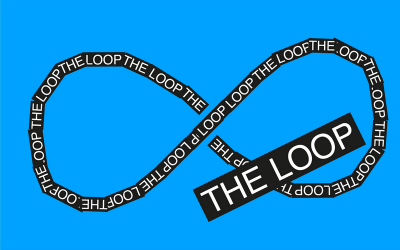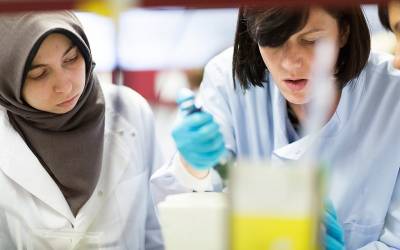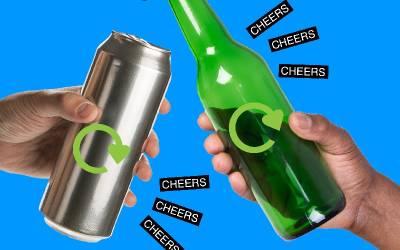LMCB and Sustainability
Cristina Azevedo talks about how she transformed LMCB into a sustainable centre and what’s they have in store for the future!
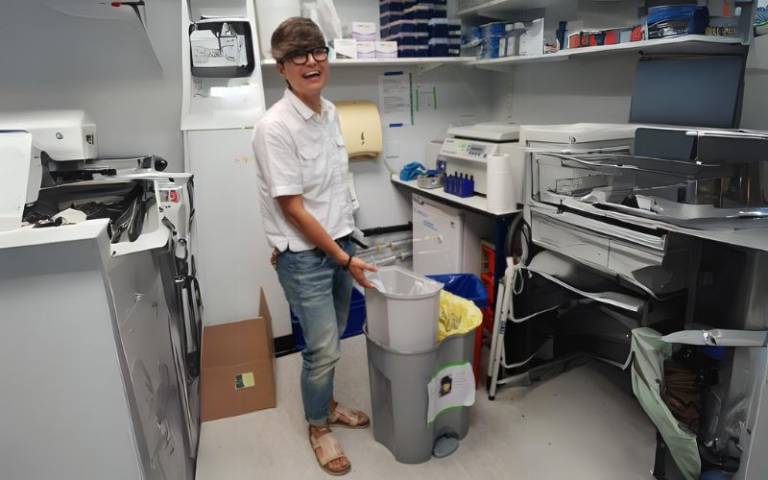
13 November 2019
UCL’s Laboratory for Molecular and Cellular Biology (LMCB) is a Medical Research Council (MRC) centre containing 17 programme leaders, 130 staff and PhD students, and is located in the heart of UCL’s Bloomsbury campus. I’ve been researching the role of non-enzymatic protein post-translational modifications on different cellular functions at the LMCB for the past 14 years, and simultaneously have always been passionate about the environment. Those two passions at times felt like they were in conflict, as my research requires an immense consumption of single-use plastics which would always end up incinerated. Equally I couldn’t help but notice a few practices around the LMCB which I felt could be improved with regard to the environment.
Greeners-LMCB team
In 2017 we got an email asking if anyone in the building would like to be involved in sustainability. A few of us showed interest and the Greeners-LMCB team initiative started. Soon we were more than ten super enthusiastic scientists wanting to make a difference. One of our first initiatives was to find representatives from each lab, creating a network ready to receive and relay instructions from the Greeners.
Bring your own mug
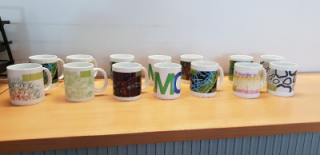
Waste incineration
We also wanted to address the laboratories, as these are the high-impact areas. The area that particularly seemed to inspire staff and students was waste. Everyone could visually see the quantities of plastic we were incinerating. We sat and discussed our options, and realised that a lot of the plastic going for high-temperature incineration in tissue culture labs (TC) was essentially clean and could be recycled if done thoughtfully. In some TC labs we introduced the bins you can see me holding in the photo and in others we substituted clinical waste for mixed recycling bins. We produced new simple guidance for users on what didn’t need to be incinerated. We also advertised the existence of glass pipettes free of charge from our amazing sterile services and introduced small glass flasks that could substitute 15-50 ml falcons (that you see me using in the photo). We engaged the entire centre on how this could be done safely, and the results were immediate!
Joining LEAF
While developing our Greeners-LMCB group, we were approached by UCL’s sustainability team about participating in their awards programme, then using an older system. Today the LMCB uses LEAF, short for the Laboratory Efficiency Assessment Framework. Developed by Sustainable UCL, LEAF is an attempt to create a real standard in sustainable science. We’ve found it much better than the previous model as it has fewer criteria, but still hits all the areas we are interested in such as freezers, procurement, plastic and even research quality. Interestingly LEAF has calculators which helped estimate the impact of our actions. This really helped convince new arrivals on the importance of making labs sustainable. After we moved over to the LEAF system, we haven’t looked back.
Our hope is that the LMCB can act as inspiration to the wider sector on what can be done, particularly through a team effort. Some of our former Green-LMCB member have already started to spread the good word, and now the MRC at Imperial have their own burgeoning Green team as inspired by Rebeca Pereira Crespo Fiadeiro.
I think today people really want to get involved and find out how they can improve the sustainability of their labs. We just need to provide them with the simple tools to do that, and we’re excited to see LEAF facilitate that process!
 Close
Close


